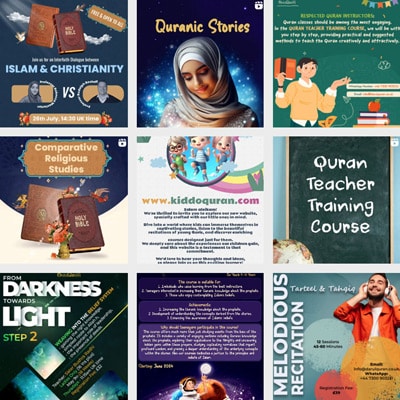Who learns in his adolescence, his learning likes a stone graving and who learns in his oldness, his learning likes writing on the surface of water.
Prophet Muhammad (S)
Table of Contents
TogglePeace and anxiety are two contrasting emotions that have a profound impact on individuals and societies.
The Noble Quran the sacred scripture of Islam addresses these emotions and provides guidance on how to attain peace and alleviate anxiety.
This essay aims to explore the concept of peace and anxiety from the perspective of the sacred Quran highlighting verses that emphasize the importance of peace and offer solutions to overcome anxiety.
Definition of Peace in the Sacred Quran
Inner Tranquility
Peace is a concept that holds immense significance in the Grand Quran.
While peace is often associated with the absence of conflict, the Holy Quran goes beyond this conventional definition and emphasizes inner tranquility as the true essence of peace.
According to the Glorious Quran, peace is not merely an external state but a state of inner harmony and serenity.
The Noble Quran teaches that true peace can only be achieved through submission to Allah and following His guidance. It emphasizes that inner tranquility can be attained by aligning one’s thoughts, actions, and intentions with the will of Allah.
This alignment brings about a sense of contentment and fulfillment that transcends worldly conflicts.
Furthermore, the Holy Quran stresses that peace is not limited to personal well-being but extends to fostering harmonious relationships within society.
It encourages believers to promote justice, compassion, and forgiveness as means to establish peaceful coexistence among individuals and communities. The Sacred Quran highlights that attaining inner tranquility requires self-reflection and self-discipline. It urges individuals to engage in introspection, seek forgiveness for their shortcomings, and strive for self-improvement.
By purifying their hearts from negative emotions such as envy, anger, and greed, believers can achieve a state of inner calmness.
According to the Holy Quran’s teachings on peace, it is evident that true peace lies in achieving inner tranquility through submission to Allah’s will. This encompasses aligning one’s thoughts and actions with divine guidance while promoting justice and compassion in society.
By striving for self-improvement and purifying their hearts from negative emotions, individuals can experience lasting peace within themselves and contribute towards establishing a peaceful world around them.
Harmony
The Holy Quran, the sacred book of Islam, provides a comprehensive guide for leading a peaceful life. One of the key concepts emphasized in the Sacred Quran is harmony, which serves as a fundamental definition of peace.
Harmony can be understood as the state of balance and unity among individuals, communities, and nations.
The Noble Quran emphasizes that true peace can only be achieved through harmony. It encourages believers to establish harmonious relationships with others by promoting justice, compassion, and understanding.
The concept of harmony is deeply rooted in Islamic teachings and is reflected in various verses throughout the Grand Quran.
For instance, Allah states in Surah Al-Hujurat (49:13), “O mankind!
Indeed, we have created you from male and female and made you peoples and tribes that you may know one another.” This verse highlights the importance of recognizing diversity and fostering mutual understanding among different groups.
By embracing diversity and respecting one another’s differences, individuals can contribute to a harmonious society.
Furthermore, the Glorious Quran emphasizes the significance of resolving conflicts peacefully.
It encourages believers to seek reconciliation rather than retaliation when faced with disputes or disagreements. Allah says in Surah Al-Anfal (8:61), “And if they incline to peace, then incline to it [also]”.
This verse highlights the importance of striving for peaceful resolutions instead of perpetuating violence or hostility.
Harmony serves as a defining aspect of peace according to the Holy Quran. By promoting justice, compassion, understanding, embracing diversity, and seeking peaceful resolutions to conflicts; individuals can contribute towards establishing a harmonious society based on Islamic principles.
The teachings found within this sacred text provide valuable guidance on how to achieve inner peace as well as foster peace within our communities and across nations.

Spiritual Serenity
According to the Sacred Quran, spiritual serenity is attained through various means such as prayer, remembrance of Allah, and acts of kindness towards others.
These practices help individuals establish a deep connection with their Creator and cultivate a sense of inner calmness that transcends worldly concerns.
The Noble Quran states, “Indeed, in the remembrance of Allah do hearts find rest” (13:28), highlighting the significance of remembering Allah as a source of solace and peace.
Furthermore, the Grand Quran encourages believers to engage in acts of compassion and justice as a means to attain peace both within themselves and in society.
It teaches that true peace can only be achieved when individuals strive for righteousness and work towards establishing social harmony based on justice and equality.
According to the Holy Quran, spiritual serenity is central to defining peace. It emphasizes that true peace lies in establishing a deep connection with Allah through prayer and remembrance while also promoting compassion and justice towards others.
By embracing these teachings, individuals can experience inner tranquility while actively contributing to creating a peaceful society based on righteousness and equality.
Causes of Anxiety in the Holy Quran
Uncertainty
One verse that emphasizes this concept is found in Surah Al-Isra: “And say: My Lord! Increase me in knowledge” (17:80).
This verse acknowledges that humans are limited in their understanding and knowledge. The uncertainty surrounding what lies ahead can lead to feelings of unease and apprehension.
Additionally, Surah Al-Baqarah states, “Whoever fears Allah – He will make for him a way out and will provide for him from where he does not expect” (2:286).
This verse highlights how uncertainty can be alleviated through trust in Allah’s guidance. However, it also acknowledges that unexpected challenges may arise, causing anxiety.
Surah Al-Ankabut states, “Do people think that they will be left alone because they say: ‘We believe,’ and will not be tested?” (29:2).
This verse reminds believers that trials and tribulations are an inevitable part of life.
The uncertainty surrounding these tests can lead to anxiety as individuals grapple with their ability to overcome them.
Uncertainty serves as a significant cause of anxiety in the Holy Quran. Through its verses, the Grand Quran recognizes human limitations in knowledge while emphasizing trust in Allah’s guidance.
It also acknowledges that unexpected challenges and tests are an integral part of life. By reflecting on these teachings and seeking solace through faith, individuals can find comfort amidst uncertainty and alleviate their anxieties.
Greed and Materialism
Greed and materialism are two prominent causes of anxiety discussed in the Sacred Quran.
Quran emphasizes the importance of contentment and warns against the detrimental effects of excessive desire for worldly possessions.
In Surah Al-Baqarah, verse 96, Allah says, “You will surely find them the greediest of people for life – [even] more than those who associate others with Allah.”
This verse highlights how greed can consume individuals to an extent that they prioritize their own desires over their spiritual well-being.
The pursuit of material wealth becomes a source of constant worry and anxiety, as one is never satisfied with what they have.
Moreover, Surah Al-Imran, verse 14 states, “Beautified for people is the love of that which they desire – of women and sons, heaped-up sums of gold and silver.”
This verse elucidates how material possessions can become a source of obsession leading to anxiety.
People are often preoccupied with accumulating wealth and possessions to gain societal status or fulfill their desires. However, this constant striving for more creates an unending cycle of dissatisfaction and restlessness.
The Grand Quran offers remedies to combat greed and materialism-induced anxiety.
It encourages believers to be content with what they have been blessed with by Allah.
In Surah At-Talaq, verse 4 it states, “And whoever fears Allah – He will make for him a way out.” This verse reassures individuals that if they put their trust in Allah rather than in worldly possessions, He will provide them with peace and tranquility.
Seeking Peace through Faith and Submission
Embracing Faith
Faith has always played a pivotal role in seeking peace and tranquility throughout human history.
In the context of Islam, faith is not merely a belief system; it is an all-encompassing way of life that encourages individuals to submit themselves to the will of Allah.
The Holy Quran serves as a guidebook for Muslims, providing them with principles and teachings that promote peace within themselves and society.
The Glorious Quran emphasizes the importance of embracing faith as a means to attain inner peace.
It teaches believers to trust in Allah’s plan, even during times of adversity. By submitting oneself to His will, Muslims find solace and comfort in knowing that their struggles are part of a greater purpose.
Furthermore, faith also plays a crucial role in fostering peace within society.
The Sacred Quran promotes justice, compassion, and forgiveness as essential components for establishing harmonious relationships among individuals.
It encourages believers to treat others with kindness and respect, regardless of their differences.
Additionally, embracing faith enables individuals to overcome conflicts by promoting dialogue and understanding rather than resorting to violence or aggression.
The Noble Quran teaches Muslims to seek peaceful resolutions through patience, forgiveness, and empathy.
Embracing faith as a factor of seeking peace through faith and submission in the Holy Quran is essential for both personal well-being and societal harmony.
By adhering to its teachings, Muslims can find inner peace while actively contributing towards creating a peaceful world based on justice and compassion.

Peace in Submission
In today’s chaotic world, the pursuit of peace has become an essential aspect of human existence.
The Sacred Quran, as a divine scripture, provides guidance on how to attain peace through faith and submission. It emphasizes that true peace can only be achieved by surrendering oneself to Allah’s will.
Submission is a fundamental concept in Islam, symbolizing complete trust and reliance on Allah.
Quran teaches that by submitting to His commandments, individuals can find inner tranquility and harmony with others.
This submission is not a sign of weakness but rather an act of strength and humility.
Faith plays a crucial role in seeking peace according to the Holy Quran. Believers are encouraged to have unwavering faith in Allah’s wisdom and plan for their lives.
By placing their trust in Him, they can overcome fear, anxiety, and conflicts that disrupt personal or societal peace.
The Noble Quran also highlights the importance of seeking peace through peaceful means. It promotes dialogue, forgiveness, and compassion as ways to resolve conflicts peacefully.
Muslims are urged to be peacemakers who strive for justice while avoiding aggression or violence.
The Holy Quran emphasizes that true peace lies in submitting oneself to Allah’s will with unwavering faith.
By embracing this concept of submission and seeking peaceful resolutions through dialogue and compassion, individuals can contribute towards creating a harmonious society where lasting peace prevails.
Overcoming Anxiety through Prayer and Remembrance
Prayer
Prayer, a spiritual practice deeply rooted in the Tafsir of the Sacred Quran, has been proven to be an effective tool for overcoming anxiety.
In today’s fast-paced and stressful world, anxiety has become a prevalent issue affecting millions of individuals.
However, through prayer and connecting with a higher power, one can find solace and peace amidst the chaos.
The Holy Quran emphasizes the importance of prayer as a means to seek guidance and comfort from Allah.
It teaches us that through prayer, we can surrender our worries and fears to Him, knowing that He is in control of all things.
This act of submission allows individuals to let go of their anxieties and trust in Allah’s divine plan.
Furthermore, prayer provides a sense of community and support for those struggling with anxiety.
In congregational prayers such as Jummah or Taraweeh, individuals come together as one unified body seeking solace from their worries.
This collective experience creates a sense of belonging and reminds individuals that they are not alone in their struggles.
Moreover, prayer acts as a form of meditation that helps calm the mind and reduce stress levels.
When engaged in prayer, individuals focus on reciting verses from the Holy Quran or engaging in supplication.
This redirection of attention away from anxious thoughts allows for relaxation and tranquility to take over.
Prayer is an essential factor for overcoming anxiety in Tafsir of Quran.
It provides comfort, guidance, community support, and serves as a form of meditation to calm the mind. By incorporating regular prayer into our lives, we can find strength amidst our anxieties and develop a deeper connection with Allah.
The Role of Patience and Trust in Alleviating Anxiety
Patience
The Noble Quran is a divine book that serves as a guide for Muslims in all aspects of life.
It provides solace and comfort to those who seek guidance and understanding. However, interpreting the Quran can sometimes be challenging, leading to anxiety and confusion among believers.
In such situations, patience and trust play a vital role in alleviating these feelings.
Patience is an essential virtue emphasized in the Sacred Quran itself.
It teaches believers to have patience during difficult times and to trust in Allah’s wisdom.
When faced with anxiety while trying to understand the Glorious Quran, one must exercise patience and not rush into conclusions or interpretations. The process of comprehending the Grand Quran requires time, effort, and reflection.
Furthermore, trust in Allah’s guidance is crucial when seeking clarity from the Noble Quran.
Believers should have faith that Allah will provide them with understanding at the right time.
Trusting in His divine plan helps alleviate anxiety by reminding individuals that they are not alone in their quest for knowledge.
Seeking assistance from scholars or knowledgeable individuals can also help alleviate anxiety during Tafsir (interpretation) of the Holy Quran. These experts have dedicated their lives to studying and understanding the complexities of the Quranic text.
Their guidance can provide reassurance and clarity when faced with confusion or doubt.
Patience and trust are fundamental principles that aid in alleviating anxiety during Tafsir of the Holy Quran.
By exercising patience, trusting in Allah’s wisdom, and seeking guidance from knowledgeable sources, believers can find solace and peace while interpreting this divine book.

Trust
Anxiety is a common human experience that can be debilitating and overwhelming.
In the Tafsir of the Holy Quran, trust in Allah plays a vital role in alleviating anxiety.
The Grand Quran emphasizes the importance of relying on Allah and having faith in His plans.
Trust in Allah allows individuals to surrender their worries and fears to Him, knowing that He is all-knowing and all-powerful.
This trust provides solace and comfort, as it reminds believers that they are not alone in their struggles. The Sacred Quran states, “And whoever relies upon Allah – then He is sufficient for him” (65:3).
This verse highlights the power of trust in Allah as a means to find peace amidst anxiety.
Furthermore, the Tafsir of the Holy Quran teaches that trusting in Allah’s plan helps individuals understand that everything happens for a reason.
Even during times of distress or uncertainty, believers can find solace by recognizing that there is wisdom behind every situation.
This understanding brings about a sense of tranquility and reduces anxiety.
In addition to trust, seeking guidance from the Noble Quran itself can also alleviate anxiety.
The Holy Book provides verses that offer comfort and reassurance during difficult times. For instance, “Indeed, with hardship comes ease” (94:5) reminds individuals that challenges are temporary and will eventually be replaced with ease.
Trust in Allah plays a significant role in alleviating anxiety according to the Tafsir of the Holy Quran.
By relying on Him and having faith in His plans, individuals can find solace amidst their worries.
Additionally, seeking guidance from Quran itself offers comfort during challenging times. Ultimately, placing one’s trust entirely on Allah enables believers to overcome anxiety and find inner peace.
In conclusion the Holy Quran addresses the concepts of peace and anxiety providing guidance on how to attain peace and alleviate anxiety.
The Quranic verses emphasize the importance of embracing peace both as an inner state of tranquility and as a social construct.
Additionally, the Sacred Quran offers solace and reassurance to individuals experiencing anxiety encouraging them to seek Allah’s guidance and find comfort in remembrance.
By following the teachings of the Holy Quran individuals can strive for peace within themselves and contribute to the establishment of peace in society.

















